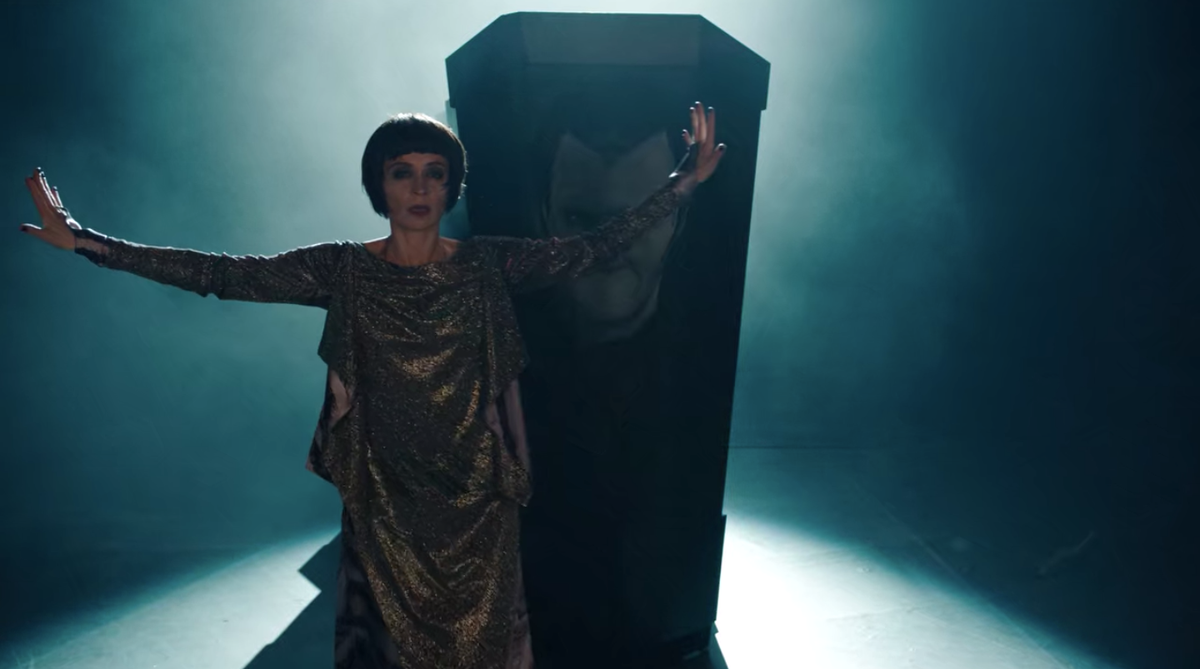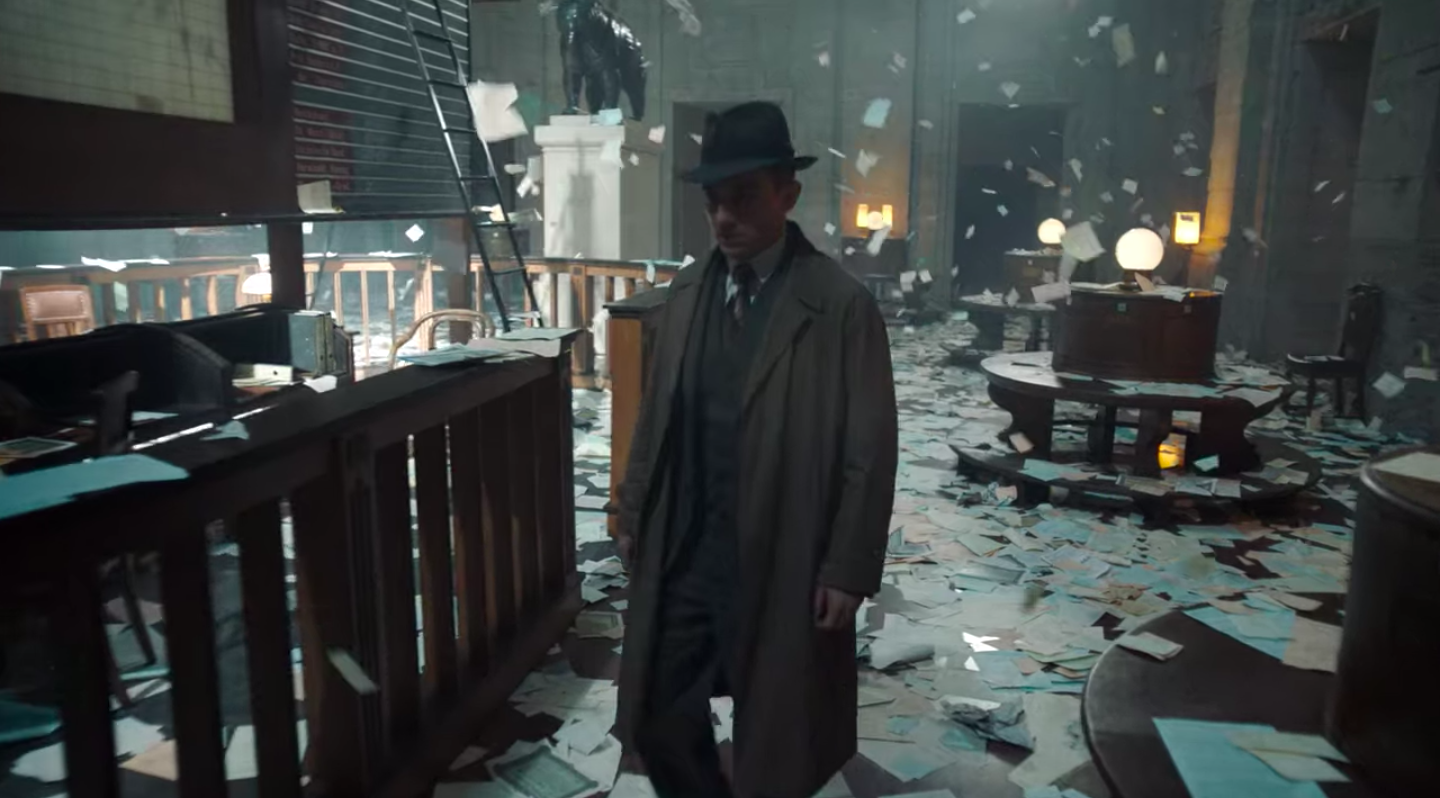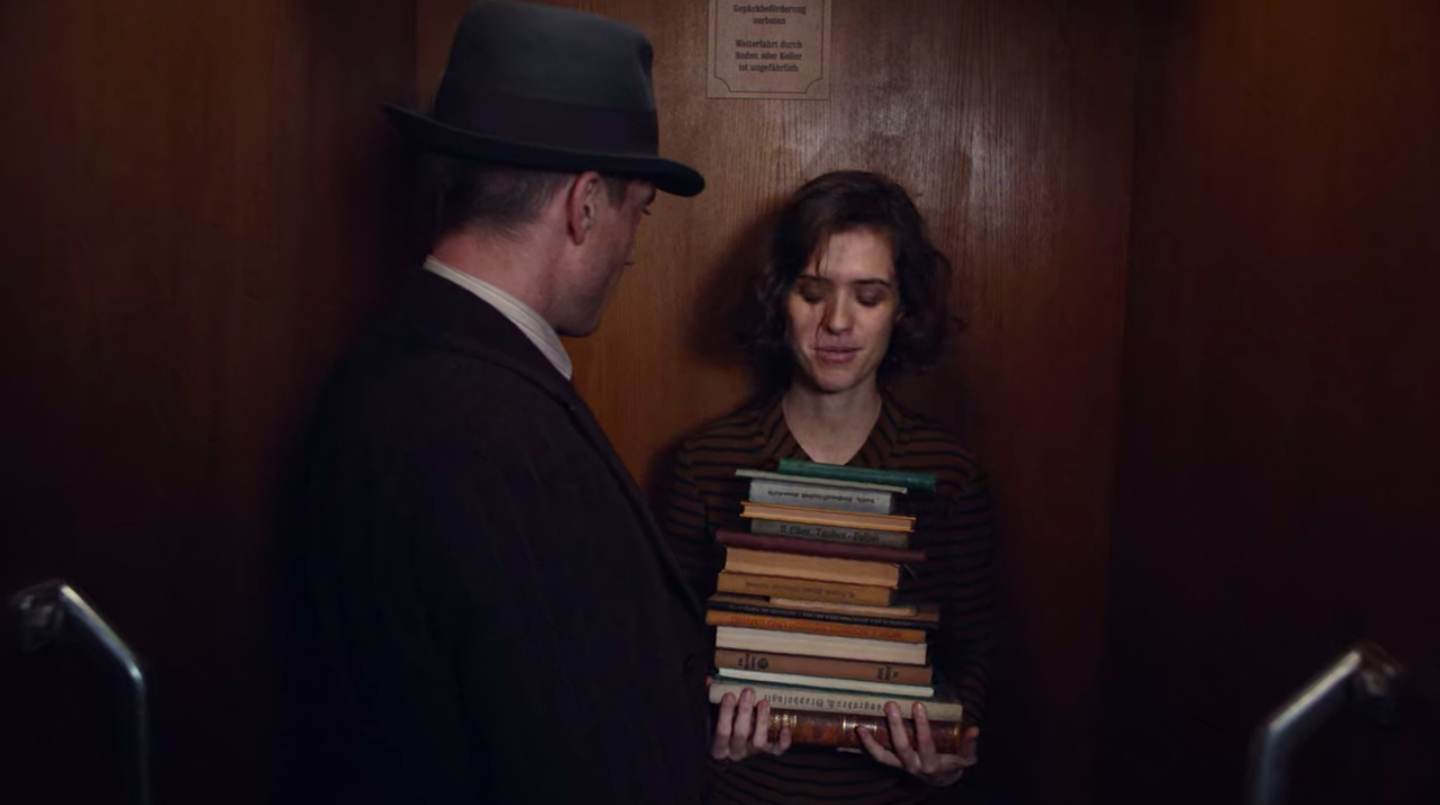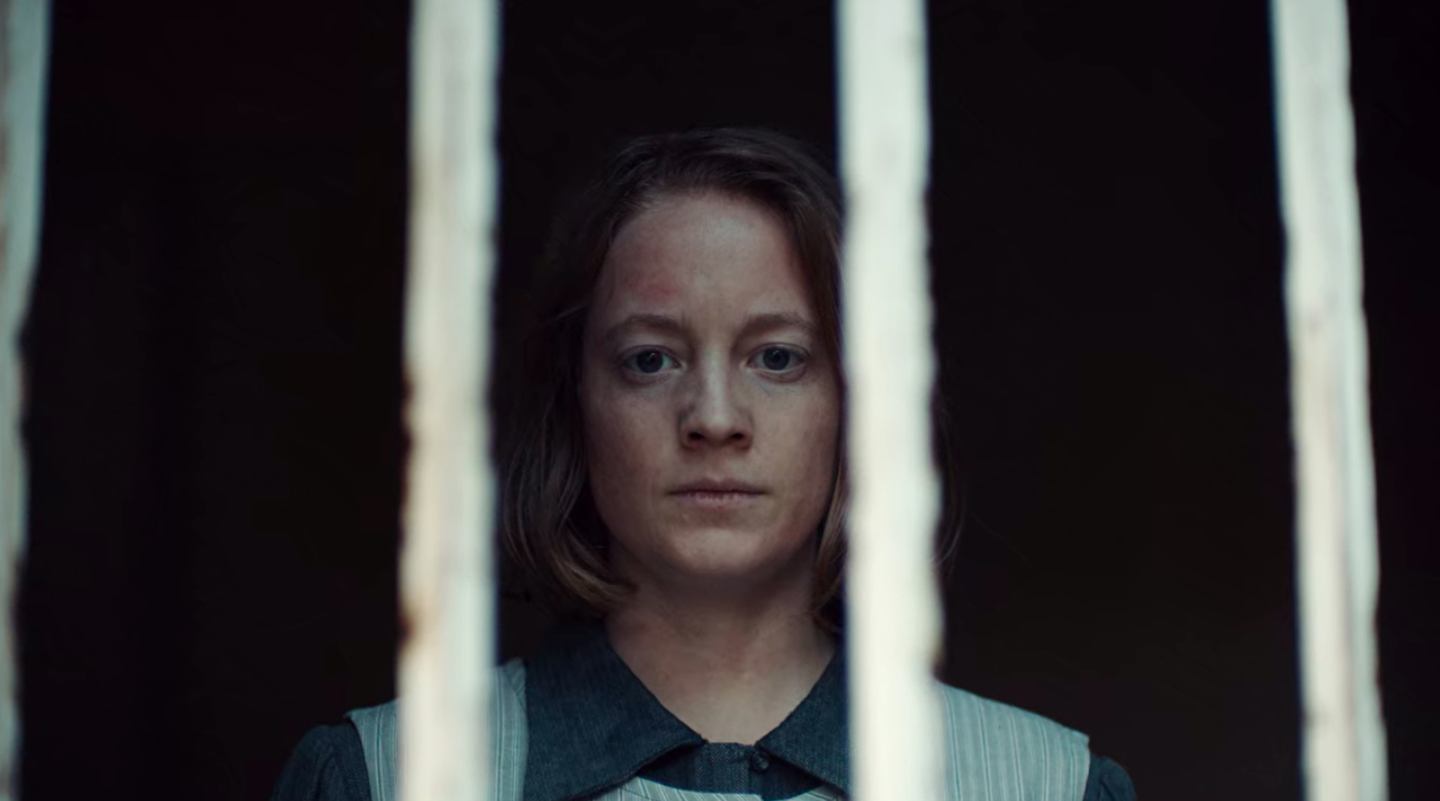Babylon Berlin: "Episode 17" and "Episode 18" (with Alan Sepinwall)
In which there's a dang ol' ghost

(For the foreseeable future — aka as long as this quarantine lasts — Emily will be watching the critically acclaimed German drama Babylon Berlin, a neo-noir set in 1929 Germany. The series is available on Netflix in the United States. For every installment, she will be joined by a special guest. Today’s guest is Rolling Stone TV critic Alan Sepinwall. Find him there or on Twitter.)

Emily: In our review of the second season finale, Kathryn VanArendonk and I talked about how nice it is that Babylon Berlin has a very television feel to it. That finale wraps up the show’s story arcs with aplomb, while leaving just enough room to move forward on future seasons.
The season three premiere doubles down on that deeply TV feeling. This episode almost felt to me like one of the Mad Men premieres. Time has moved forward incrementally. The characters are all doing their thing. There’s Gereon! And Charlotte! And Greta! And the Armenian! And, uh, Helga! The kids are all 15 feet taller than they were in the first two seasons! (Amusingly, the beginning of the third season takes place, like, four months after the end of season two. There’s something in the Berlin water!) Berlin is still a massive pile of decadence and debauchery, but you’ll occasionally see swastika armbands on the streets. Everything is changing, and nothing is changing. Just like a season premiere should do.
There’s also a confidence to these two episodes that only a show hitting its full stride could manage. The sequence where Gereon and Charlotte simultaneously carry out the Gennat method to solve two totally separate crimes in two different locations (Gereon’s real, Charlotte’s a training exercise) is just delightful, only enhancing my desire to see these two kids kiss. The musical number on the film set where Betty the actress dies is appropriately morose and macabre. Greta stone-cold watching a woman get beheaded with an axe tells me more about who she’s becoming than anything in season one. A flash-forward composed to seem like a single shot follows Gereon through the horrors of the 1929 stock market crash. And all around these characters, the plot to install a more dictatorial regime swirls.
But, bless these episodes, they’re also so fuckin weird. Gereon apparently disappears into the sewers to have a chat with his brother/psychiatrist. Someone is running around and murdering people while dressed as a ghost. The flash-forward has the hazy intensity of a nightmare.
There are a bunch of things in these two episodes I’m taking a wait and see approach with — particularly the gangster Weintraub who joins The Armenian for a little light melodrama, like he’s Tony Blundetto or something — but at their core, I was impressed with how smart and efficient the storytelling was here. Alan, I was surprised to learn you watch this show, because its everything-against-the-wall style felt like the opposite of your thing, though I know you love a great cop show. What do you like about Babylon Berlin?

Alan: Ahem. Some of my favorite shows of all time very much adopt an "everything against-the-wall style," as you put it, from Twin Peaks to Jane the Virgin. When a show is successful at straddling multiple genres and tones at once, I enjoy few things more. (Another recent addition to the Netflix international cop show library, the English/Japanese saga Giri/Haji, similarly won me over once it stopped just being an overheated crime story and began incorporating anime and even modern dance!)
Sometimes, though, the hybrid approach leaves me cold, like with Netflix's new Parisian jazz club drama The Eddy, which can't decide if it wants to be the French Tremé or the French Ozark. But that's because the crime scenes always feel like a late addition to make the thing more commercial — whereas Babylon Berlin's many seemingly mismatched pieces all make sense together when you step out to appreciate them all.
I must confess that I haven't made it very far into the new season, though that owes much more to quarantine fatigue than any inherent flaws. I just find myself not quite having the mental energy to watch subtitled shows (I'm way behind on My Brilliant Friend Season Two for the same reason). Occasionally, I would switch to the dubbed version in the first two seasons just to get through the expository passages where Gereon and/or Charlotte were investigating crimes, but the show is so much better in the original German that I'm waiting until I can focus more before returning to it.
But gosh, I absolutely loved the return to this strange and foreboding world. The apparent oner at the stock exchange at the start of the Great Depression knocked me out, and the Fritz Lang-esque movie musical number was even more mesmerizingly strange than any of Svetlana's drag king numbers from the first two seasons. (I do miss Svetlana, though, and I defy you to name a show on television that would not be improved by revealing that one of their female characters had a secret drag king persona.) That Gereon is hanging out in the sewer for therapy/brainwashing with his brother seems about right, and I'm fascinated by how the show depicts Charlotte's career arc. There's obviously some degree of sexism in the Berlin police force, but it's far subtler than what's usually depicted in period American dramas, and the fact that she's been able to move from nightclub prostitute to apprentice homicide investigator with relative ease is striking.
Charlotte's also at the center of the most charming scene in either episode, where she and her sister clean up the mess left by the day sleeper who shares their apartment, while singing a song about how women should take over the country. This is by design a dark show, but there's always room for whimsy when you least expect it.
How do you feel that Season Three so far stacks up compared to the batch of episodes we got a couple of years ago? Do you ever find yourself switching over to the English dubs, or are you a subtitle purist? And if they're beheading prisoners on camera in the second episode, how much more brutal is this season going to get?
Emily: I want to clarify that I was not sure if you would be a fan of this show because it’s good, not just because it throws everything at the wall.
Like you, I’m not very far in — though that’s by design. I’m trying not to watch ahead as I do these recaps, though there are points (like in the back half of season two) where I ultimately just can’t help myself. It’s still really difficult to pace myself, even when the show is in “setting up the dominoes” mode.
But if I were to compare these two episodes to the first two of season one — the most comparable in the series’ run so far — I’d say these two blow those two away on average. There’s nothing here as enthralling as “Zu Asche, Zu Staub,” but that musical number was as much a statement of purpose as anything else. It was there to tell you that this show was not afraid to mix up tones and do weird things if it would get the emotional reaction from you that the show requires. Now that we know that’s true of the series, it doesn’t have to work as hard to hook us. (Then again, a mysterious figure disguised as a ghost loosening a piece of lighting equipment so it will kill a starlet while she’s performing a musical number about death is not exactly a thing you see every day on TV.)
One big reason these two episodes don’t have to work overtime to keep us watching: Gereon and Charlotte now have a deeply entrenched partnership and friendship, which constantly flirts with becoming a romance. Remember how the early going of this show had to believably find a way to bring them together as a crime-solving force? With all of that out of the way, the third season can just let the two of them bounce off of each other, even as Charlotte is dealing with the institutional sexism of the police department. (I agree with you that the depiction of sexism here is refreshing — it’s so often just one guy saying one thing that derails everything you’ve been working on to that point! And then you throw yourself forward again, fruitless though it may seem.)

I’m also way more invested in their personal lives than I thought I would be. Charlotte and Toni’s apartment-sharing situation (how long before this becomes an app?) is joyful in a way her at-home stories rarely were in season one, and I’m at least mildly more invested in the slow dissolution of Gereon and Helga’s whole deal. (I wish the show would come clean on what, exactly, she’s doing with Nyssen, which we’re so clearly meant to think is an affair that I’m pretty sure it will be anything else.)
But what’s really intriguing this season is the way it’s presenting both characters’ professional advancement against the backdrop of What We Know Is Coming. When Moritz has an encounter with some proto-Hitler youth (even if they’re not yet called that), it’s forthright about the future in a way neither of the first two seasons were, and I do not think it’s an accident that the season’s biggest new character has the surname “Weintraub.” (I am reliably informed by Wikipedia that Jewish participation in organized crime was a big thing in Berlin before the rise of the Nazis, which is a.) interesting and b.) something the show will have to handle with extreme care, not that I expect it to do anything else.)
We also know that Wendt is much more pro-fascism than his predecessor, Benda, was. Benda was trying his damnedest to hold a failed system together; Wendt is only too happy to let the system fail, because he suspects it will be to his ultimate benefit. But both Gereon and Charlotte are working under this guy. We don’t yet know how much of a blind eye they’re turning — though Gereon is at least aware forces are aligned against him given how hard he’s working Greta’s case — but they are aware something dark is bubbling up. And yet… things are going so well for them personally…
I am really excited to see where this larger theme is going, because it has the potential to be horribly dark and tragic, but also necessary in a way a lot of glitzy prestige TV doesn’t feel right now. It is really not hard for me to look at these two, celebrating each and every step forward, and not think about how I am complicit in all sorts of terrible things, mostly unintentionally, but rarely without awareness of my complicity. And yet… things are going so well for me personally…
(Of course I only watch the German language version. I am not a subtitles purist, but the English-language dub on this show is so bad. It’s honestly one of the worst I’ve ever heard. I am almost offended you would suggest I even think about doing so.)
How do you think this show is handling the deteriorating political situation in Berlin, a situation that will only get worse when the Depression arrives? And what do you think of this season’s big murder mystery so far? Is it just the right level of over-the-top or a little bit too much?
Alan: Not to bring everything back to The Sopranos (have I reminded you lately that I wrote a book about that show?), but the introduction of Weintraub did remind me of a line from the first season's "A Hit is a Hit," where a Jewish therapist wistfully recalls the reign of gangster Louis "Lepke" Buchalter, saying, "Those were some tough Jews."
Like you, I don't think Weintraub's apparent Semitism is a coincidence. The first two Babylon seasons largely kept the rise of the Nazis in the background, the better to establish the highs and lows of the Weimar Republic before the story became overwhelmed with the group that brought the Weimar era to a vicious, ultimately genocidal end. I think these new episodes do a good job gradually nudging the fascists closer to center stage, even as Gereon and Charlotte are our primary POV characters.
Given the unfortunate ways that fascism and white supremacy have come back into vogue in recent years, I confess that my appetite for depictions of the Nazi's rise may not be that strong. (I had a hard time getting myself to watch HBO's The Plot Against America despite admiring almost everything about it and being a David Simon enthusiast of long standing.) But this is where the story obviously has to go, and I'll brace myself for that darkness when it comes.
For the moment, though, my interest is more in the wider depiction of the period, and in Gereon and, especially, Charlotte. When it briefly looked like Charlotte had drowned to death last season, I was disappointed, because she seemed the more original and interesting creation of our two heroes. But they make a great professional pairing: him the respected and (for the moment) relatively powerful cop who's secretly a hot mess, and her the savant who's constantly being overlooked because of her gender. Come to think of i, I've also just described Don and Peggy from Mad Men, haven't I? Well, now I very much want to see Charlotte strutting down a corridor with a filebox while wearing sunglasses and dangling a cigarette from her lips before this is all over.
The mysteries in each season have largely felt like Macguffins to me. Which is one of the reasons I was comfortable last time switching to the awful dubbed versions for the plottier sections: I really don't care about whodunnit, or why, just so long as I get to spend some more time in this world and with the two leads. The murder at the studio is interesting insofar as it provides entree into the world of German cinema in what I understand was a really interesting time for moviemaking there. But why the light rig was dropped on the leading lady? Whatever happens, happens.
Are you invested in the mysteries? In the fate of poor, manipulated Greta Overbeck? And why are you ducking my very important question about adding a drag king to every other show in Peak TV?
Emily: I’m interested in the mysteries in the way I am in most noir stories — as a window into a larger, more complicated world than the characters can ever really hope to understand. The business about the train of gold and Operation Prangertag in the first two seasons ultimately ended up being a window into all of the political machinations going on that neither Gereon nor Lotte could wholly begin to understand. The ultimate “identity” of the gold train felt like a wink from the show to the audience on this point. The answers are hiding in plain sight. You just don’t know how to look for them yet.
But do I care about the identity of the phantom of the German expressionism? Not particularly. I’m sure it will turn out to be somebody interesting, but the fact that this season opens with Gereon watching as the world falls apart around him and not with him throwing someone in a ghost costume into the back of a police van indicates that this show is, as always, most interested in the larger sociopolitical stuff than it is the crime of the season.
But the crime of the season is important, because it’s the engine that makes everything else go. So I can not particularly care about it while also acknowledging that as crimes go, this one is pretty neat. It has a unique setting in a German film studio at the advent of the sound era (I somehow never thought about how movies like this would require an on-set orchestra to provide their music) and a compellingly mysterious villain and a neat cast of characters. (I’m already in to the American starlet living in Berlin, and I think she’s gonna end up being a big part of this story.)
On the other hand, the fact that yet another crime is wrapped up in the Armenian — even if he’s a bigtime criminal kingpin — strains credulity a bit. (It seems way more likely the producers just wanted to keep that actor around, and honestly, more power to them. He’s got big future potential as the hero of an AMC show here in the States.) And after the first two seasons largely revolved around mysterious contraband, an apparently unkillable Russian, and a political coup, it feels a little humdrum to have this season begin as a murder mystery, though I’m sure this is heading somewhere much bigger than a mere murder would suggest. (Look at me saying “a mere murder.”)

But moving on to a different suspected (not yet convicted!) criminal… Greta.
It’s honestly a bit hilarious to me that Leonie Benesch is now the third-billed actor in the cast, mostly because Greta outlasted a bunch of characters who died at the end of season two. In these first two episodes, she’s so sidelined from the main action, because she doesn’t want to talk to Lotte and is just chilling in jail. And yet she’s also our main window into the rise of the Nazis, because she accidentally got wrapped up in that whole [waves hands around vaguely distastefully] situation. Thus, the show has tied the idea of Greta being vindicated to our obviously faulty hopes that maybe, this time, in a fictional world, the Nazis will be foiled.
And yet there’s Fritz just hanging out in a stable, performing his new job, ready to spread more political unrest another day. I don’t know how thoroughly the Nazis in 1929 were useful pawns to rich business interests in the German elite, but it’s certainly not hard to imagine that was the case (come back to us, Tomke!). And yet how often do rabblerousers upend the entire system to their own benefit, destroying so many other things in the process? The politics of Babylon Berlin are knottier than you might expect for a show featuring literal Nazis. And yet the true bad guys often seem to be the rich.
Also of course every show should have a woman who is secretly a drag king. (Obvious nominee: On Mom, Allison Janney’s character begins leaving behind her multi-camera confines to appear at a sultry night club shot in single-camera, where she sings the My Chemical Romance catalog but reimagined as jazz standards.)
Alan, as we approach the end of this discussion, I do have to ask you: What the fuck do you think is up with Gereon’s brother? Does he really live underground??? Also, uh, do you still doubt (as I do) that he's actually Gereon's brother?
Alan: Allison Janney would make an excellent drag king, especially at her height. Seventh Emmy, here we come!
As for Gereon, his brother, and the sewers, when you have a main character with a history of drug abuse, and when your show on the whole is given to moments bordering on the surreal, it's entirely fair to question what's real and what's happening inside our man's head. My notes on these episodes read like I'm Bernard from Westworld, with a lot of "Is this real?" and "Is this now?"
But where this might annoy me on some other recent shows (I eventually gave up on Westworld), the uncertainty here works because it is, for the moment, confined to this one corner of the show. Gereon needs to be an extremely vulnerable, perhaps unreliable, narrator for his presence to not overwhelm Charlotte's in their burgeoning partnership. And there are times with this show (like with Twin Peaks, or the various Noah Hawley shows for FX) where the fundamental weirdness becomes a pleasure in and of itself.
So I'm looking forward to seeing how the rest of this season plays out, whenever I feel I have enough brain power to return to subtitles. But I suspect I used up most of my reserves in that area watching Portrait of a Lady on Fire, Emily — on your urgent recommendation, no less!
Emily: Well, you can never go wrong with Portrait of a Lady on Fire! I’m glad that you saw one of the greatest films ever made.
I probably don’t need to remind people where they can find your work, Alan, but just in case this Babylon Berlin recap is somehow their first introduction to your work, where can my readers find your work, Alan?
Alan: I’m the chief TV critic for Rolling Stone. You can find my reviews and recaps here, and follow me on Twitter, Facebook, and Instagram. I’m also the author of several books about TV, including The Sopranos Sessions, Breaking Bad 101, TV (THE BOOK), and The Revolution Was Televised.
Emily: Wow, that reads suspiciously like boilerplate you’ve copy-pasted from somewhere else, but I’ll let it slide. Thank you again! It was a true delight.
Next week: episodes 19 and 20! I don’t know who will be joining me yet! It’s sure to be exciting!




